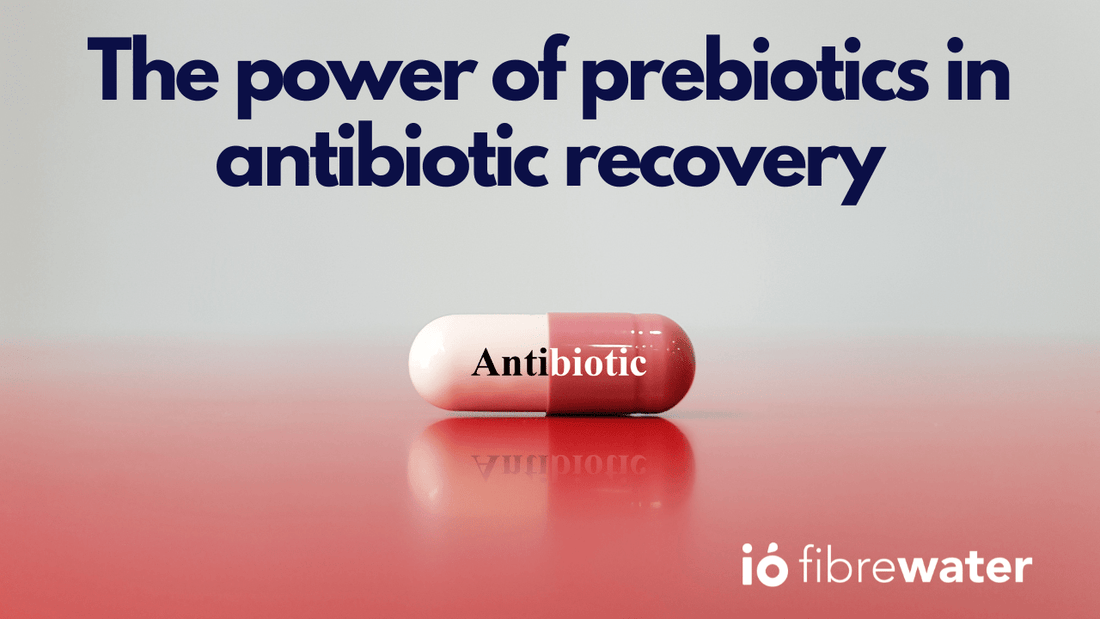The gut microbiome reigns supreme in our bodies' complex ecosystem. Comprised of trillions of microorganisms, this dynamic community of bacteria, fungi, viruses, and other microbes plays a pivotal role in our overall health. However, this delicate balance can be disrupted, especially when antibiotics are involved.
Antibiotics are undoubtedly life-saving medications, effectively combating bacterial infections and saving countless lives. Yet, their indiscriminate nature doesn't just target harmful bacteria but also wipes out beneficial microbes in the gut.
This disruption can lead to digestive problems, including diarrhoea, constipation, and even more severe conditions like antibiotic-associated colitis.
Plus, gut health can affect your overall health and well-being! Did you know that 90% of your happy hormone, serotonin, is produced in your gut and can affect anxiety, depression, mood and sleep?
So, how can we restore harmony in our gut microbiome after a course of antibiotics? Enter prebiotics.
In this blog, we will delve into:
- Understanding prebiotics
- The role prebiotics play in antibiotic recovery
- Incorporating prebiotics into your diet
- An easy way to get 100% of your daily prebiotics
Understanding Prebiotics
Prebiotics are non-digestible fibres found in certain foods that fuel the beneficial bacteria in our gut.
Unlike probiotics, which are live bacteria, prebiotics provide the nourishment necessary for these beneficial microbes to grow and function in our intestines. Think of prebiotics as the fertiliser that helps cultivate a thriving garden of gut bacteria.
Find out more about prebiotics here:

The Role of Prebiotics in Antibiotic Recovery
When we take antibiotics, the diversity and abundance of our gut microbiota can suffer. This loss of microbial diversity may weaken our immune system and compromise various aspects of our health.
Incorporating prebiotics into our diet can help replenish and diversify our gut microbiome, promoting resilience and enhancing our overall well-being.
Ps. Did you know 70% of your immune cells live in your gut? That's why a healthier gut helps support a healthier you!

Prebiotics as part of your antibiotic recovery can help with:
-
Restoring Balance: Antibiotics can disrupt the delicate balance of bacteria in the gut, favoring the growth of harmful pathogens. Prebiotics encourage the proliferation of beneficial bacteria like Bifidobacteria and Lactobacilli, helping restore equilibrium and crowding out potential pathogens.
-
Enhancing Digestive Health: Prebiotics are crucial in maintaining optimal digestive function. By fermenting prebiotic fibres, beneficial bacteria produce short-chain fatty acids (SCFAs) like butyrate, which nourish the cells lining the gut, strengthen the intestinal barrier, and reduce inflammation.
-
Boosting Immune Function: A significant portion of our immune system resides in the gut, interacting closely with the microbiome. Prebiotics support immune health by promoting the growth of beneficial bacteria that stimulate immune responses, helping defend against infections, and supporting overall immune function.
-
Reducing Antibiotic Side Effects: Antibiotic therapy often has unpleasant side effects like diarrhoea and gastrointestinal discomfort. Studies suggest that supplementing with prebiotics during and after antibiotic treatment may help alleviate these symptoms by supporting gut health and reducing the disruption caused by antibiotics.
Incorporating Prebiotics into Your Diet
Fortunately, prebiotics are readily available in many common foods, making them easy to incorporate into your daily diet. Some excellent sources of prebiotic fibres include:
- Vegetables: Onions, garlic, leeks, asparagus, and Jerusalem artichokes are rich in inulin, a type of prebiotic fibre.
- Fruits: Bananas, apples, berries, and kiwi contain pectin, another prebiotic fibre that supports gut health.
- Whole Grains: Oats, barley, and wheat contain soluble fibres like beta-glucan and arabinoxylan, which serve as prebiotics.
- Legumes: Beans, lentils, and chickpeas are excellent sources of resistant starch, a prebiotic fibre that nourishes beneficial gut bacteria.
However, chicory root fibre is the #1 source of prebiotic fibre! We use this in our revolutionary, gut-loving water, ió fibrewater.
An easy way to boost your prebiotics intake is here!
ió fibrewater is a trailblazing functional water is backed by science, with two authorised health claims and two university studies (Glasgow Caledonian University and the University of Roehampton) proving a wide range of health benefits, including:
- Significantly increasing friendly probiotic microbes (Glasgow Caledonian University)
- Significantly lowering weight, blood pressure and fasting blood glucose levels, as well as improving sleep, mood, eating behaviours and cognition (the University of Roehampton)
Why not experience the difference a bottle of ió fibrewater can make in just 12 days? And get up to a 22% discount? Just use the code '12Day20' at checkout!
Take the ió fibrewater 12-Day Challenge by clicking here!
Have a look at the results below 👇people have had in drinking one bottle of ió fibrewater a day for 12 days (one case).
Conclusion
Maintaining a healthy gut microbiome is essential for overall well-being, especially after a course of antibiotics.
While antibiotics may disrupt the delicate balance of our gut bacteria, incorporating prebiotics into our diet can help restore harmony and promote recovery. By nourishing beneficial bacteria and supporting digestive health, prebiotics play a vital role in antibiotic recovery, ensuring that our gut remains a thriving ecosystem of microbial diversity and resilience.
So, let's nurture our gut with the power of prebiotics and pave the way for optimal health and vitality. And one of the easiest ways to boost your prebiotics intake is by drinking scientifically proven ió fibrewater - which delivers 100% of your daily prebiotics enjoyably (and deliciously, too!)






